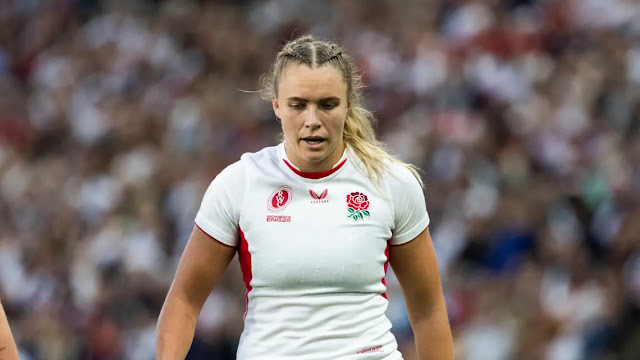In a significant blow to England’s Women’s Rugby World Cup campaign, captain Zoe Aldcroft has been ruled out of the remainder of the pool stage due to a knee injury sustained during the team’s victory over the United States last week. The news, reported by British media on Thursday, August 28, 2025, has cast a shadow over England’s preparations as they aim to maintain their momentum in the tournament. With Aldcroft sidelined, former captain Marlie Packer will take the helm for England’s upcoming match against Samoa on Saturday, as coach John Mitchell makes sweeping changes to the lineup, introducing 13 alterations to the starting XV. This strategic reshuffle reflects England’s depth and ambition to provide game time to a broad roster while building on their strong start to the competition.
A Setback for England’s Title Aspirations
The Women’s Rugby World Cup, held in 2025, is a pivotal moment for England, who are among the favorites to lift the trophy. As one of the most successful teams in the tournament’s history, with two titles and a reputation for dominance, England entered the competition with high expectations. Zoe Aldcroft, a towering figure in women’s rugby, has been instrumental in their success, bringing leadership, physicality, and tactical acumen to the squad. Her knee injury, sustained during England’s hard-fought win over the United States, is a significant setback, particularly in the crucial pool stage where consistency and momentum are key.
Aldcroft’s absence will be felt both on and off the field. As captain, she has been a unifying force, guiding England through a period of transition and growth under head coach John Mitchell. Her ability to lead by example, whether through her work in the lineout, her defensive tenacity, or her ability to inspire her teammates, has made her a cornerstone of the team. The injury, while not detailed in its severity by the initial reports, is serious enough to rule her out for the remaining pool matches, raising questions about her potential return for the knockout stages.
Marlie Packer Steps Up as Interim Captain
With Aldcroft sidelined, the responsibility of leading England falls to Marlie Packer, a seasoned flanker and former captain who is no stranger to the pressures of leadership. Packer, known for her relentless work rate and physical presence in the back row, is a natural choice to take the reins. Her experience and familiarity with the squad will be crucial as England face Samoa, a team that suffered a crushing 73-0 defeat to Australia in their opening match. While Samoa presents a less formidable challenge on paper, Packer’s leadership will be key to ensuring England maintain their focus and execute their game plan with precision.
Packer’s appointment as captain for the Samoa match underscores the depth of leadership within the England squad. Her ability to rally the team and maintain cohesion, particularly with a heavily rotated lineup, will be critical. The decision to hand her the captaincy also reflects coach John Mitchell’s confidence in her ability to step up in Aldcroft’s absence, ensuring continuity in the team’s ethos and performance.
John Mitchell’s Strategic Overhaul: 13 Changes to the Lineup
Coach John Mitchell has taken a bold approach to the Samoa match, making 13 changes to the starting XV that defeated the United States. This extensive rotation is part of a deliberate strategy to provide game time to a wide range of players across the first two pool matches, ensuring the squad remains fresh and versatile as the tournament progresses. “It has been in our planning to give everyone game time over the first two pool matches,” Mitchell said in a statement shared by England Rugby. “Our new combination want to make each other proud and build on our performance against USA in our opening match.”
The revamped England team for the Samoa match is as follows:
15. Emma Sing (Fullback)
14. Jess Breach (Right Wing)
13. Megan Jones (Outside Centre)
12. Jade Shekells (Inside Centre)
11. Claudia Moloney-MacDonald (Left Wing)
10. Helena Rowland (Fly-Half)
9. Lucy Packer (Scrum-Half)
8. Maddie Feaunati (Number 8)
7. Marlie Packer (Openside Flanker, Captain)
6. Abi Burton (Blindside Flanker)
5. Rosie Galligan (Lock)
4. Lilli Ives Campion (Lock)
3. Sarah Bern (Tighthead Prop)
2. Lark Atkin-Davies (Hooker)
1. Kelsey Clifford (Loosehead Prop)
This lineup reflects a blend of emerging talent and experienced players, with the likes of Jess Breach, Sarah Bern, and Marlie Packer providing stability, while younger players such as Maddie Feaunati and Kelsey Clifford gain valuable World Cup experience. The inclusion of Lucy Packer at scrum-half and Helena Rowland at fly-half signals Mitchell’s intent to test new combinations in the half-back positions, potentially laying the groundwork for tactical flexibility in the knockout stages.
Mitchell’s decision to rotate so extensively is a testament to England’s squad depth, a hallmark of their success in recent years. By giving players like Emma Sing, Claudia Moloney-MacDonald, and Lilli Ives Campion starting roles, Mitchell is fostering a culture of competition and opportunity, ensuring that every member of the squad feels invested in the team’s journey. This approach also mitigates the risk of over-reliance on key players, particularly in light of Aldcroft’s injury, and prepares the team for the physical and mental demands of a long tournament.
The Samoa Challenge: An Opportunity to Build Momentum
England’s match against Samoa presents an opportunity to build on their opening victory over the United States and fine-tune their game plan. Samoa, who were overwhelmed by Australia in their first match, are unlikely to pose the same level of threat as some of the tournament’s heavyweights, such as New Zealand or France. However, Mitchell will be keen to ensure that his team approaches the game with professionalism and intensity, using it as a platform to refine their attacking patterns, defensive structures, and set-piece execution.
The 73-0 scoreline in Samoa’s loss to Australia highlights the gulf in class between the Pacific Island nation and the top-tier teams. For England, this match offers a chance to experiment with new combinations while maintaining their dominance. Players like Jess Breach, a prolific try-scorer, and Sarah Bern, a powerful presence in the front row, will be expected to lead the charge, while the new faces in the lineup will have an opportunity to make their mark on the World Cup stage.
Mitchell’s focus on building on the performance against the United States suggests that England are not content to rest on their laurels. The opening match, while a victory, likely exposed areas for improvement, particularly in terms of cohesion and execution under pressure. With Aldcroft’s injury forcing changes, the Samoa game will serve as a testing ground for England’s ability to adapt and maintain their standards, regardless of personnel.
The Broader Context: England’s World Cup Ambitions
England’s Women’s Rugby World Cup campaign is about more than just navigating the pool stage; it’s about reclaiming their status as the preeminent force in women’s rugby. Having won the title in 1994 and 2014, England have a storied history in the competition, but recent tournaments have seen them fall short against rivals like New Zealand, who have dominated the sport. The 2025 World Cup represents an opportunity for England to reassert their dominance and cement their legacy under Mitchell’s leadership.
Aldcroft’s injury, while a setback, is not insurmountable given the strength of England’s squad. The team’s depth, bolstered by the rise of young talent and the experience of veterans like Packer, positions them well to navigate the challenges of the pool stage and beyond. The key will be maintaining consistency and building chemistry among the players, particularly with the extensive rotation employed in the early matches.
The pool stage is just the beginning of England’s journey, with tougher tests likely to come in the knockout rounds. Teams like New Zealand, France, and Australia remain formidable opponents, and England will need to be at their best to progress to the final. Aldcroft’s potential return for the knockout stages could provide a significant boost, but in her absence, players like Packer, Breach, and Bern will need to step up to fill the void.
The Women’s Rugby World Cup: A Growing Global Stage
The 2025 Women’s Rugby World Cup is a landmark event for the sport, showcasing the growth and increasing popularity of women’s rugby. With participation from teams across the globe, including emerging nations like Samoa, the tournament highlights the sport’s inclusivity and potential for expansion. England, as one of the leading nations, carries the responsibility of not only competing for the title but also inspiring the next generation of players and fans.
The injury to Aldcroft underscores the physical demands of the game and the resilience required to compete at the highest level. It also highlights the importance of squad depth and adaptability, qualities that England have in abundance. As the tournament progresses, the focus will be on how Mitchell and his team manage challenges like injuries, fatigue, and tactical adjustments, all while maintaining the intensity and precision that have made them a powerhouse.
The Road Ahead: England’s Path to Glory
With Aldcroft sidelined, England’s immediate focus is on securing a strong position in their pool to advance to the knockout stages. The match against Samoa is an opportunity to build confidence and cohesion, particularly for the new players in the lineup. Mitchell’s strategy of rotating the squad ensures that England remain fresh and prepared for the challenges ahead, but it also places a premium on maintaining consistency across different combinations.
The broader goal for England is to peak at the right time, with the knockout stages offering a chance to showcase their full potential. The return of Aldcroft, if feasible, would be a major boost, but the team’s depth means they are well-equipped to handle her absence in the short term. Players like Marlie Packer, who brings experience and leadership, and emerging talents like Maddie Feaunati, who represent the future of English rugby, will be crucial to the team’s success.
Beyond the on-field battles, England’s campaign is about inspiring a new generation of rugby players and fans. The Women’s Rugby World Cup is a platform to showcase the skill, athleticism, and passion of the players, and England’s performances will play a significant role in elevating the sport’s profile. The leadership of Packer, the flair of players like Breach, and the strategic vision of Mitchell all contribute to a narrative of progress and ambition.
Conclusion
The injury to Zoe Aldcroft is a significant challenge for England as they navigate the pool stage of the 2025 Women’s Rugby World Cup, but it is not one that will derail their ambitions. With Marlie Packer stepping into the captaincy and John Mitchell implementing a bold rotation strategy, England are well-positioned to maintain their momentum against Samoa and beyond. The 13 changes to the lineup reflect the team’s depth and versatility, while also providing opportunities for new players to shine on the global stage.
As England continue their journey in the tournament, the focus will be on building cohesion, refining their game plan, and preparing for the knockout stages. The Women’s Rugby World Cup is a celebration of the sport’s growth and potential, and England’s campaign, despite the setback of Aldcroft’s injury, is a testament to their resilience and determination. With a blend of experience, youth, and tactical acumen, England remain a formidable force, ready to chase glory and inspire fans around the world.





